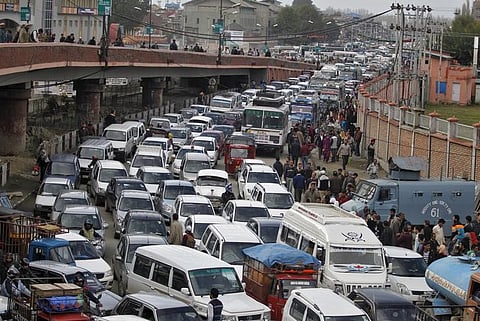
- Home
- Live Blog
- Breaking News
- Top Headlines
- Cities
- NE News
- Sentinel Media
- Sports
- Education
- Jobs

AGARTALA/DHAKA: The Bangladesh, Bhutan, India, Nepal Motor Vehicles Agreement (BBIN MVA) would boost the economy of these countries, according to experts who attended a seminar in Dhaka.
Strongly supporting the BBIN MVA at the seminar on Wednesday, the experts reiterated that while the framework agreement for this initiative was signed in June 2015, it is still to be implemented owing to a number of challenges like lack of adequate infrastructure, differences in regulations and trust deficit among its signatories, a statement said on Thursday.
"Coupled with the basic dearth, cumbersome paperwork involved in doing border clearance is causing traffic congestion at border posts," it said.
This regional policy dialogue centred on the BBIN MVA was organised Bangladesh NGO Unnayan Shamannay jointly with Bhutan Media and Communications Institute, Nepal Economic Forum and research and advocacy group CUTS International with support of the US State Department .
The execution of the BBIN MVA is expected to commence from early next year. The BBIN Motor Vehicles Agreement, signed by the four countries aims to facilitate movement of passengers and cargo between these countries.
As the Northeastern States share 5,437 km of international boundaries with Bangladesh (1,880 km), China (1,300), Myanmar (1,643 km), Bhutan (516 km) and Nepal (98 km), India's mountainous regions would be benefit after implementation of the BBIN MVA.
CUTS International Executive Director Bipul Chatterjee said: "While the BBIN MVA will directly and indirectly benefit the economies of these countries, there is an imperative to look beyond the agenda of building roads and simple exchange of traffic rights. It should be enabled with appropriate regulatory, financial and digital connectivity among individuals, businesses and government if we are to unlock the true potential of their economic integration with each other."
Leading Bangladeshi NGO Unnayan Shamannay Chairman and former Governor of Bangladesh Bank Atiur Rahman said: "Bangladesh has always been in favour of opening of regionalism and the present political equations among the governments of these countries are conducive towards an effective implementation of the BBIN MVA."
Pete Gauthier, Private Enterprise Officer at the Economic Growth Office of the U.S. Agency for International Development, Bangladesh stated that any sub-regional cooperation should always look at how to create a win-win situation for all stakeholders involved and hence should aim at growing the pie instead of splitting it.
Bangladesh Parliament member and President of the Bangladesh Women Chamber of Commerce and Industry, Selima Ahmed, emphasised the need for developing women-friendly policies and infrastructure to encourage more women's participation in trade once the BBIN MVA comes into effect.
"There should be clarity among policymakers on why a policy has been framed. There is no point improving border infrastructure if countries keep resorting to various trade restrictive measures", said Policy Research Institute of Bangladesh Research Director Mohammad Razzaque. The importance of multi-modal connectivity to avoid congestion at border crossings, the need for setting up inland container depots, use of railways, waterways and airways as alternate modes of transportation were highlighted during the discussions.
Over 40 participants comprising government officials, policy experts, civil society representatives and media personnel participated in this day-long deliberation.
The participants also underlined the importance of using new technologies to develop an online trade facilitation platform and an appropriate risk management system to facilitate faster cargo clearance at border crossings. (IANS)